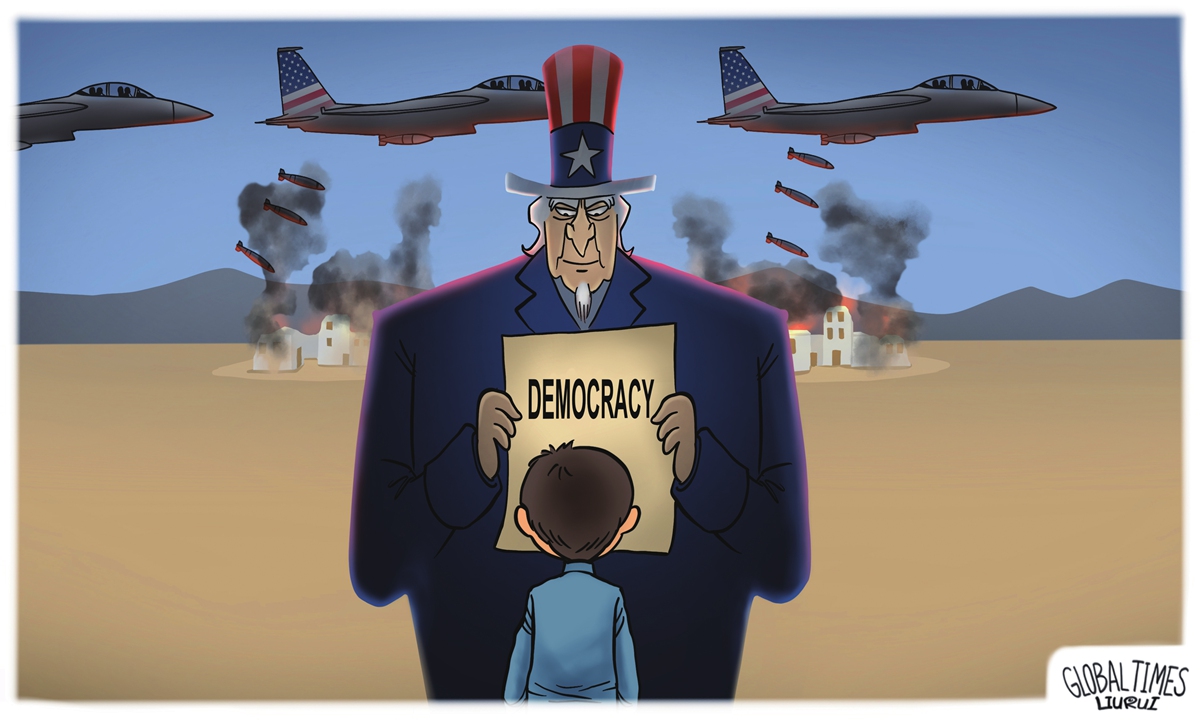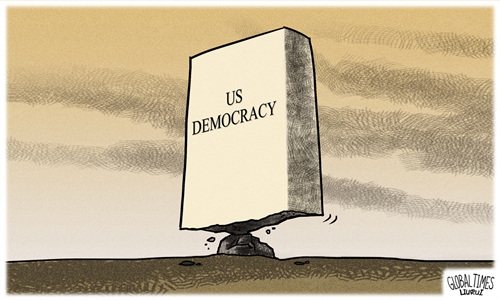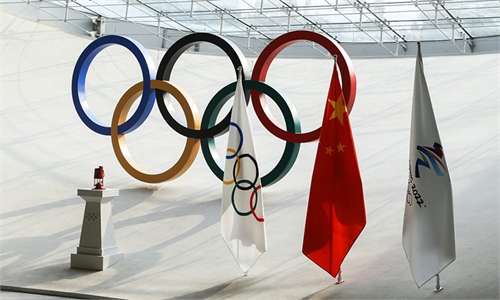
Democracy hypocrite Illustration: Liu Rui/GT
Flashback to the 1950s, when CIA director Allan Dulles made a stirring recount of the Soviet Union's "mental warfare" during the Cold War. "The human mind is the most delicate of all instruments. It is so finely adjusted, so susceptible to outside influences that it is proving a malleable tool in the hands of sinister men." Three days after the speech, Dulles approved a top-secret CIA program for the "covert use of biological and chemical materials." Although "American values" made for good rhetoric, it was in fact a part of the brainwashing agenda.The specter from the Cold War still haunts the world. The ambition to shape others to the US' liking has never changed, except for potentially less subtlety and scruples. Since the late 1980s, the US has been imposing its self-styled democracy onto countries through the "Color Revolution" in Eurasia, "Arab Spring" in North Africa and the Middle East, and New Monroe Doctrine in Latin America, to name just a few. Political meddling, military intervention and regime change are among the many cards held up US sleeves, all of which have deprived countries of their right to development. For the US, other countries are no more than "guinea pigs" in their "democratic experiment." And the outcome, with more failure than success, is to be stomached by the recipients themselves.
Regime changes often flared up in the former Soviet republics. The "Rose Revolution" in Georgia, "Tulip Revolution" in Kyrgyzstan, "Orange Revolution" in Ukraine, among others, were stirred up by external forces such as the US State Department, which was frank about its central role in fulfilling its president's pledge to spread democracy and end "tyranny" worldwide. In September this year, Russia protested against the US for the latter's suspected interference in the State Duma's election. When local people are satisfied with their own governments, the US cannot wait to replace them with their preferred alternatives, resulting in pre-election chaos, disruption of social order, and ultimately, serious blows to local economies and livelihoods. No development whatsoever.
The US hand in the "Arab Spring" sent even greater shock waves, which still linger and hurt to this day. In 2011, the New York Times revealed that US-government-sponsored organizations promoted American democracy in regional countries, in total disregard of national realities and development models. The spearheading entities and personnel were trained and funded by the International Republican Institute, National Democratic Institute, Freedom House and the like. But their bubbles burst quickly. Just two years after the "democratic revolution" in Tunisia, locals were dismayed by the reality. According to the Pew Research Center, 72 percent of Tunisians were dissatisfied with how their democracy was working, including 42 percent who said they were not at all satisfied.
Kidnapping local people's aspirations for better governance has taken much more brutal form. The wars in Libya, Syria and Afghanistan wreaked havoc despite being waged in the name of promoting democracy. In 2010, Libya was the wealthiest country in Africa according to the World Bank and IMF statistics. A decade later, its per capita income shrank to less than a third of what it was, nearly 1 million people needed humanitarian assistance and 5.6 million people lost their homes. The Syrian War killed more than 400,000 people. More than 1.5 million were disabled and 2.5 million children dropped out of school as a result. The more than 6 million refugees formed the largest group of the kind in the world. Such tragedy was the last thing anyone would hope for. Yet, it was forced upon by the US, which ironically calls itself the "beacon of democracy."
The US doesn't care if its democratic trials overseas are successful. Therefore, the question becomes: What does it want? The plight of Latin America even till this day may offer some inspiration. The US uprooted governments that didn't follow its commands, and "cut the veins" of others that failed to bow to its power. Land, resources, labor and markets were all harnessed to serve US hegemony. Some Latin American countries dedicated their entire national economy to one particular sector, be it planting, mining or others. They were thus shackled into an economic structure designed by the US. The Monroe Doctrine in 1823 gained a new lease of life centuries later. In a globalized world, what follows the arrival of democracy is in fact the opposite to development - destruction at the hands of the US.
The latest Pew research found that only 17 percent of those surveyed worldwide say democracy in the US is a good example for others to follow. Another 23 percent don't believe it has ever been a good model. Even 8 percent of Americans said they don't believe that their country has ever been such an example. Besides, nearly half of respondents in 53 countries polled by the Alliance of Democracies Foundation are concerned that the US threatens their country's own internal democracy.
Former CIA director Mike Pompeo advertised another CIA mantra when he said, "We lied, we cheated, we stole." Indeed. Using the disguise of democracy, the US tricks others to believe in "democracy's" effect on their development, buts hides its sole purpose of exploitation and consolidation of US dominance. But the US political circle should not fancy themselves smart. President Abraham Lincoln himself warned, "You cannot fool all the people, all the time."
The author is a commentator on international affairs, writing regularly for Global Times, CGTN, etc.. He can be reached at xinping604@gmail.com.



